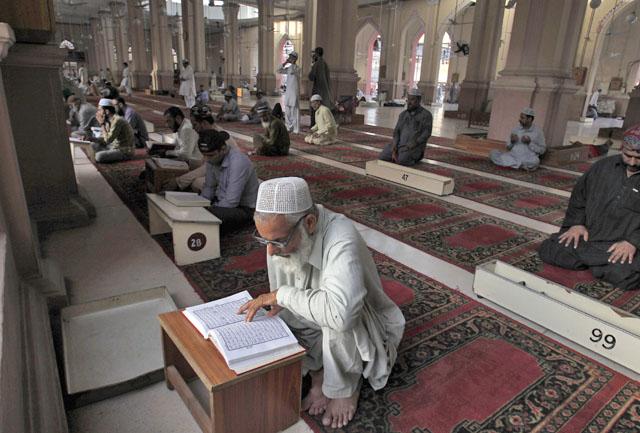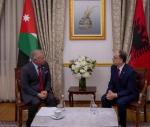You are here
Pakistan air strikes on Taliban hideouts kill 15
By AFP - Feb 21,2014 - Last updated at Feb 21,2014
MIRANSHAH, Pakistan — Pakistani jets launched strikes on Taliban hideouts in the northwest on Thursday, killing 15 people according to security sources, in retaliation for attacks by the militants which have derailed peace talks.
The first raid confirmed by security officials came early Thursday when jets bombed several locations including a compound in the town of Mir Ali and surrounding parts of the North Waziristan tribal district.
“There are confirmed reports of 15 militants including foreigners killed in these airstrikes,” a senior security official told AFP on condition of anonymity.
“Air strikes were carried out to target militant hideouts with precision,” the official said.
“A huge cache of arms and ammunition has also been destroyed.”
A second strike targeted militants hiding and arms stockpiles in the Khyber tribal district who are suspected of bombing a cinema in Peshawar last week, and killing an army major on Tuesday, a second security official said
A third security official in Miranshah, the main town of North Waziristan, said air attack lasted more than an hour, while many local residents fled to safer areas.
The air strikes and spiralling violence cast further doubt on a troubled peace process between the government and the insurgents just three weeks after talks began.
After several rounds of talks, government mediators pulled out of scheduled dialogue with their Taliban counterparts on Monday amid outrage over the claimed execution of 23 kidnapped soldiers.
On Sunday a faction of the Islamist movement from Mohmand near the Afghan border said they had killed the soldiers who were seized in the area in June 2010.
On Thursday Pakistan delivered a formal protest to the Afghan government about the incident.
Still a chance for peace
The minister for interior, Chaudhry Nisar Ali Khan, said later on Thursday that the talks were suspended because of the terrorist attacks but negotiators were still there to work for peace.
“There are clear chances that dialogue process will once again come back on track. But, negotiations and violent activities can’t go together,” he told reporters.
The Pakistan Tehreek-e-Taliban (TTP) had offered a ceasefire on Wednesday on condition that government forces stopped killing and arresting their members.
But Khan said that “elements” were using dialogue process to attack security forces, and the air strikes were self defence.
“Some people were targeting security agencies in the disguise of the talks. We can’t continue with negotiations in this atmosphere. They kidnapped and slaughtered 23 [paramilitary] soldiers just because they were patriots,” he said.
Meanwhile, unknown gunmen killed at least five people including a leader of an anti-Taliban party and a 12-year boy, in the Orangi Town, in the western part of Karachi.
Prime Minister Nawaz Sharif announced the start of talks on January 29 to “give peace another chance” following a seven-year Taliban insurgency that has claimed nearly 7,000 lives.
But a source in his office said Sharif, under pressure to avenge the Taliban killing spree, “issued orders to launch the airstrikes” after being briefed by military advisers.
Despite the new bloodshed, Professor Ibrahim Khan, a Taliban peace negotiator, told AFP Thursday there was still a chance of a settlement.
A total of 93 people have been killed since the reconciliation effort was launched at the end of January, including the kidnapped soldiers, according to an AFP tally.
The Taliban said 60 of their members had died before Thursday’s strikes. They have accused the army of executing members while they are in custody.
As well as the execution of the kidnapped soldiers and other killings, the insurgents claimed a car bomb attack on a police bus in Karachi on February 13 in which 12 officers died.
The government has demanded a ceasefire as a condition to resume the peace talks.
The TTP has been waging a bloody campaign against the Pakistani state since 2007, often hitting military targets.
Some observers have raised doubts about the ability of the central Taliban command to control all factions, including some opposed to peace negotiations.
The Taliban’s demands include the nationwide imposition of Sharia law, an end to US drone strikes and the withdrawal of the army from northwestern tribal regions — conditions unlikely to be met.
Related Articles
Pakistani fighter jets bombarded Taliban hideouts in the troubled northwest Tuesday, killing at least 30 in the fourth airstrikes since peace talks stalled, in what analysts say is a surgical operation to reassert the military’s dominance.
Pakistan’s military launched a ground assault in the North Waziristan tribal area on Monday, beginning a new phase in its offensive against Taliban militants, after nearly half-a-million civilians fled the fighting.
US drones fired missiles at Taliban hideouts in Pakistan killing at least 10 militants in response to a deadly attack on Karachi airport, officials said on Thursday, in the first such raids by unmanned CIA aircraft in six months.

















